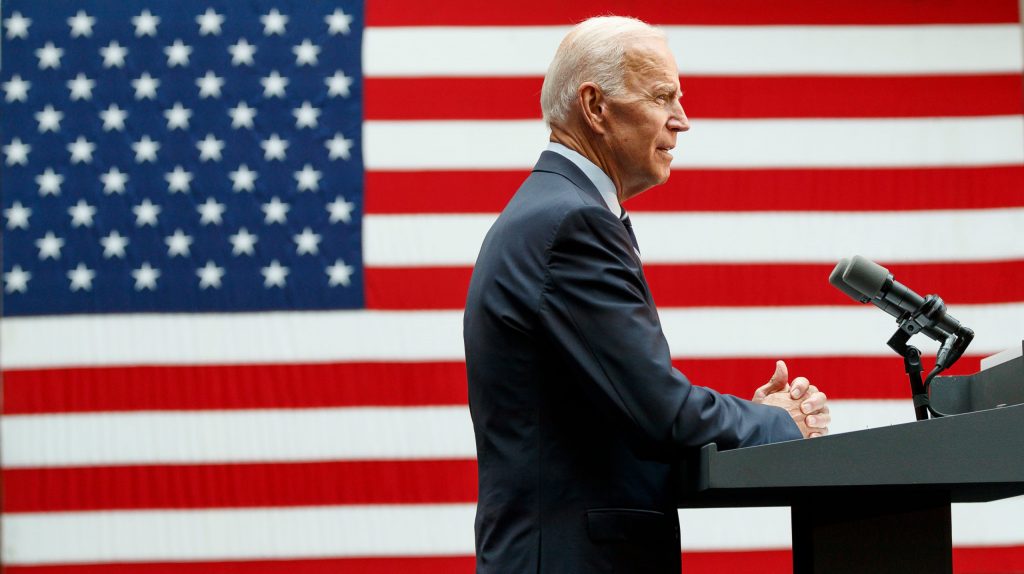Joe Biden’s first speech on foreign policy aimed to convince the U.S. population and world leaders alike that restoring the country’s legitimacy in the geopolitical arena is essential to bringing the world out of an intensifying social, political, and economic crisis — one whose roots extend far deeper than the coronavirus pandemic. The question remains, however, in the context of the U.S. empire’s decline in a changing geopolitical landscape, whether such ambitions will be possible.
The speech, given at the State Department on February 4, boiled down to two related elements: a wholesale rejection of Trump’s “America First” relative isolationism, and a renewed commitment to reconstructing U.S. imperialist hegemony with a return to neoliberal interventionism and the support of its historic allies.
With leaders around the world watching closely, much of Biden’s speech was devoted to painting a picture of the strength of U.S. capitalism despite a year of intense turmoil which marked a new phase in the country’s weakened national and international position. Domestically, this meant a deplorable response to the pandemic which has left over 451,000 people dead, skyrocketing unemployment and economic hardship for working people, a summer of heroic uprising against police terror and structural racism, and, most recently, a challenge to the legitimacy of the elections in the form of a far-right assault on the Capitol. In the international arena, 2020 saw the assassination of Iranian military leader Qasem Soleimani which brought the United States and Iran to the brink of open conflict, Trump’s withdrawal from international organizations, and an intensification of the trade war with China. In his 20 minutes at the podium, Biden tried to sweep much of this aside as just one more product of the aberration that was Trump’s presidency, rather than what it actually is: a continuation and progression of the deep political, economic, and social crisis that has shaken global capitalism since 2008 and challenged the neoliberal order to which Biden hopes to return.
You might be interested in: This Is What the Decline of U.S. Empire Looks Like
Biden began by painting a picture of a world divided: on one side, the “Free World” of democracy and law and order led by the United States, and on the other, the looming threat of authoritarianism propelled by China and Russia. Indeed, most of the areas of intervention that Biden laid out in his speech, from pushing for a “resolution” to the humanitarian crisis in Yemen and the coup in Myanmar, to promising to fight for LGBTQ+ rights internationally, were couched in the language of fighting despotism and upholding the United States’ role as the arbiter of democracy. With this perspective, and echoing his comments on the campaign trail, Biden promised to be tougher on the country’s adversaries than Trump, and to reconstruct its position as the world’s undisputed imperial power.
Regarding Russia, which has been shaken by massive protests in recent weeks after the arrest of opposition leader Alexei Navalny, Biden claimed that “the days of the United States rolling over in the face of Russia’s aggressive actions, interfering with our elections, cyber attacks, poisoning its citizens are over.” He went on to say that his administration “will not hesitate to raise the cost on Russia and defend our vital interest in our people.” He denounced Navalny’s arrest and Putin’s efforts to “suppress freedom of expression and peaceful assembly.”
Along similar lines, Biden also promised to resist China’s growing economic and political challenges to U.S. hegemony, framing it as a dutiful fight by democracy to stave off the authoritarian measures of the Chinese government. Without mentioning the form these efforts would take, he said that his administration was committed to “[taking] on directly the challenges posed [to] our prosperity, security, and democratic values by our most serious competitor … We’ll confront China’s economic abuses, [and] counter its aggressive course of action to push back on China’s attack on human rights, intellectual property, and global governance.”
Though of course Biden’s endless appeals to U.S. democracy ring hollow in the face of the country’s long record of orchestrating military and economic interventions abroad, it’s clear that in his role as president during a time of capitalist crisis, they have new meaning domestically and geopolitically. On the one hand, his remarks about the United States’ commitment to “democratic values” is meant to feed the consensus constructed around the Biden administration in the wake of Trump’s challenge to the elections and the subsequent storming of the Capitol. Building that consensus now gives the administration more room to enact policies in the interest of U.S. companies and markets in the future — policies that will threaten the living conditions of millions of working and poor people across the world.
It was yet another desperate affirmation from the U.S. state that its traditional political institutions, though diminished, can maintain control in the middle of a prolonged crisis. “Though many of [our] values have come under intense pressure in recent years, even pushed to the brink in the last few weeks,” Biden said, referencing the events of January 6, “the American people are going to emerge from this moment stronger, more determined, and better equipped to unite the world in fighting to defend democracy because we have fought for it ourselves.” Promising to increase the number of refugees admitted into the United States by over 100,000 and committing to facilitating an end to the humanitarian crisis in Yemen — including stopping certain arms sales to Saudi Arabia — many of the foreign policy measures Biden will put forward in the early days of his administration will likely be centered on proving that the United States has the legitimacy to pursue it projects domestically and abroad.
You might be interested in: Biden’s Task: Restore U.S. Institutions and Get Back to the Business of Global Domination
Departing from Trump’s “America First” rhetoric of ensuring U.S. prosperity above all else, Biden promised to put the country at the head of efforts to solve the world’s biggest issues, from the pandemic and climate change, to humanitarian crises and nuclear proliferation. In other words, Biden’s talk of the U.S.’s role as a beacon of democracy was an effort to justify to its allies — which took advantage of the Trump years to cool their relationships with the United States — that restoring U.S. legitimacy is in the best interest of a world rocked by myriad crises. But the cracks in this sunny picture are already beginning to show, as was already apparent in Biden’s short speech.
Biden went to great lengths to separate diplomacy from economic policy in the blueprint of his plans for international relations. In the same breath that he denounced the injustices of both Russia and China, he also promised to work with them on a number of common interests in the realm of trade and nuclear proliferation. But this is a false delineation — looking beyond Biden’s tired rhetoric of shining the light of U.S. “democracy” on the rest of the world, we must be clear that U.S. foreign policy is always in the service of imperialist interests. Even Biden said so himself in his speech:
Investing in our diplomacy isn’t something we do just because it’s the right thing to do for the world … We do it because it’s in our own naked self interest. When we strengthen our alliances we amplify our power … When we invest in economic development of countries, we create new markets for our products and reduce the likelihood of instability.
This was the truest statement Biden made on Thursday. His doomed project is to try to breathe new life into the neoliberal project in an attempt to maneuver better positions for the United States in the middle of a global crisis and changing geopolitical landscape. That’s been made clear enough in his choice of appointees to key positions in the field of foreign relations, from pro-Israel warhawk Antony Blinken to Iraq War commander Lloyd Austin. He might rejoin the Paris Accords and work closer with Europe, NATO, Mexico, Japan, and other U.S. allies to negotiate favorable trade policies, but this is only the monster of weakened U.S. imperialism with a slightly friendlier mask. From Trump to Biden, many of the tasks remain the same: staving off the rise of China, using international markets to shore up the economic crisis hitting the United States, and maneuvering for a stronger position for the United States on the world stage.
This is certainly true if we take a look at the things Biden didn’t mention in his speech on Thursday, including the United States’ recently reinvigorated imperialist offensives in Venezuela, Cuba, and Iran, interventions which didn’t begin with Trump and which have the support of the bipartisan regime. Even before taking office, Biden officially recognized Guaido as the legitimate leader of Venezuela. He reaffirmed that approach on Wednesday, pledging to target the Maduro regime and remove whatever obstacles it can from Guaido’s battle for power. Though Biden focused mostly on Asia and the pandemic in his first foreign policy speech, perhaps suggesting a continuation of the United States’ retreat in the Middle East, he’s a staunch supporter of Israel’s occupation of Palestine and will uphold Trump’s decision to keep the U.S. Embassy to Israel in Jerusalem. And even though Biden signed onto COVAX, the international vaccine initiative, it is clear that Biden’s concern is not for a global solution to the pandemic, but one that puts American pharmaceutical companies first. The administration is buying up doses at incredible rates, far more than are needed to vaccinate the U.S. population.
You might be interested: Against Capitalist Irrationality: For the Abolition of Patents, and Vaccines for All
The current crisis may lend itself to Biden’s rhetoric of peace, democracy, and stability, but after eight years of the Obama administration, we know what U.S. “democracy” in the international sphere looks like. When the time comes, Biden won’t hesitate to use all of the mechanisms at U.S. imperialism’s disposal to ensure its interests abroad, from sanctions and trade deals to bombings and drone strikes. As we pass through the early days of the Biden administration, we must stand staunchly against U.S. imperialist aggression in all its forms. The only solutions the United States poses to the formidable crises we face are those that will benefit U.S. capitalism to the detriment of working people across the world.











